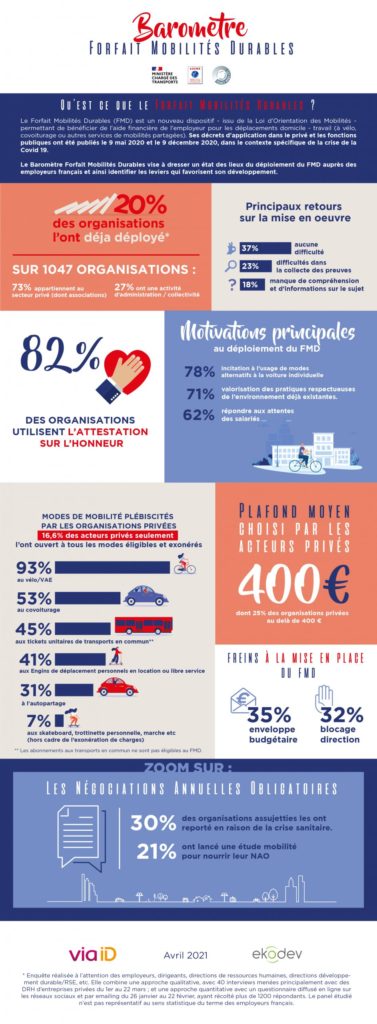
Launched by the Ministry of Transport and ADEME, with the support of France Mobilités and piloted by Via ID and Ekodev, the Sustainable Mobility Package Barometer unveils its results. The objective of this initiative is to take stock of the deployment of the FMD among French employers and to identify the levers promoting its development, in the exceptional health context we are experiencing.

Deployment of the Sustainable Mobility Package: motivations and obstacles
20%
of employers surveyed have deployed the Sustainable Mobility Package. That is 209 organizations out of 1047 surveyed.
11%
have validated it and will deploy it in the next 6 months.
400€
of the average limit is and 25% of the organizations go beyond this amount.
The main motivation for deploying the pass is to encourage the use of alternatives to the private car (78%). Also, 71% declare that they have deployed it to enhance existing environmentally friendly practices and 62% to respond to employee requests.
Employers who have deployed the FMD have encountered no difficulties for 37%, 23% have had difficulties related to the collection of evidence and 18% a lack of information and understanding of the subject. For employers with more than 5,000 employees, legal and legislative difficulties were encountered by 29% of them.
Employers who have not yet deployed the FMD cite the following as the main obstacles
- The budget to be allocated (35%)
- A project not considered a priority by management (32%)
- A perceived lack of usefulness (22%)
The fear associated with an increase in HR management is a key obstacle for some employers, particularly in terms of monitoring and justifying practices and amounts. Although the Sustainable Mobility Package is established throughout the country, this approach is sometimes perceived as being applicable only by employers located in large urban areas, as the Sustainable Mobility Package is often associated with cycling.
I am pleased to note the enthusiasm for the sustainable mobility package, one of the key measures of the Mobility Orientation Law. In view of the initial results of the barometer, efforts in terms of communication and support for employers should be continued and encouraged. I am convinced that employers have the opportunity to take advantage of this measure, despite the current health context and the massive use of telecommuting, which do not facilitate its immediate effectiveness in certain sectors of activity. The sustainable mobility package is an innovative way to commit to collectivement vers une mobilité plus durable.
A package focused on cycling and carpooling
Among the private organizations that have deployed or validated the Sustainable Mobility Package :
- 93% have opened it up to at least mechanical or electrically-assisted personal bicycles
53% for carpooling 45% for public transport tickets excluding subscriptions (ticket purchases)
41% for rental or self-service mobility devices
And 31% for car-sharing
A few employers (7%) also included walking or personal scooters, although this is not included in the legal framework of the DMF. Of note, only 16.6% of private sector organizations have opened the DMF to all eligible and exempt modes.
The average ceiling granted by organizations
In organizations subject to private law, the average ceiling is 400€ and 25% of organizations go beyond this amount. It appears that for private organizations with less than 250 employees, the average ceiling granted is 452€ and for private organizations with more than 250 employees, 214€.
The majority of companies have decided to pay the FMD for cycling and carpooling in the form of a lump sum conditional on practice rather than reimbursing expenses on presentation of receipts. Limited follow-up of the Sustainable Mobility Package by employers 82% of organizations use the certificate on honour as proof to claim the FMD. This reflects a high level of trust between organizations and their employees, which is often correlated to the size of the organization: the larger the organization, the more popular are the tools for collecting proof.
A large majority of organizations track the use of the DMF through an internal tool (61%), 27% do not track it and only 3% use an external manager. The number of beneficiaries is the most tracked indicator for 82% of organizations.
The results of this barometer underline the complexity for employers to have a vision and a coherent mobility policy for all with the multitude of existing measures (public transport, bicycle fleets, FMD, TVS exemption etc.). We believe that it is essential to support, train and communicate on the subject, and many startups are already providing innovative solutions to meet these challenges.
A need for communication and support on the subject
The Forfait Mobilités Durables Barometer reveals that employers expect more communication on the scheme. They also expect clarification on the link between the different modes, particularly with the public transport pass.
Several private sector employers, mainly in the Ile-de-France region, would like the ceiling to be raised so that it can be combined with public transport passes and allow for intermodality.
It therefore appears that respondents’ knowledge of the Sustainable Mobility Package is present but often superficial. What emerges is a need for support, training and communication to clarify the terms and issues of this tool for sustainable home-work mobility.

